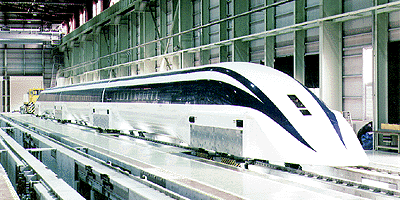|

The Superconducting Maglev, using superconductivity, represents as internationally acclaimed. cutting - edge technology
unique to all of us. Unlike the Conventional train system, it does not utilize friction between the car and the track. It
is a contractless transport system that utilizes the magnetic force that is generated between the superconducting magnets
built into the cars and the coils on the ground and therefore, unlike the conventional railway, high - speed, safety and
stable operation at a speed of 500 km/h can be realized.
|
|
| Commercial use since March 2005. |
|
|
 |
|
|
 |
|
Research into a totally new levitation railway transportation system commenced in 1962 and running tests on the Yamanashi
test line began in 1977. Many areas of the system have been gradually tested with positive results. The
interim report issued in March 2005 by the Ministry of Land, Infrastructure and Transport's Maglev Technological Practicality
Evaluation Committee was extremely positive, confirming that " a viable technology for the Maglev railway has been established
".
|
 |
|
|
|
